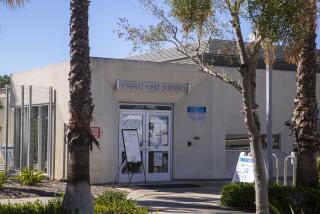Canvassers ply L.A. streets seeking unlicensed dogs
- Share via
There are 4 million people in the city of Los Angeles and who knows how many dogs. Of its canine residents, the city is sure only of this: About 120,000 are licensed -- as required by law -- and a lot of others are not.
“Nobody has ever done a census. It’s anyone’s guess how many are out there,” said Kathy Davis, general manager of L.A.’s Department of Animal Services, who declined to pick a number. “But we certainly don’t assume we have all of them licensed.”
In this time of budget cuts, that spells opportunity for revenue.
Dogs don’t make money. But the City Council is betting that going after their owners for license fees will help fill L.A.’s cash-starved coffers.
A license for a sterilized dog costs $15. An owner with an unaltered dog has to pay $100 -- plus possibly $120 more for the breeder’s license technically required for unaltered dogs. (There are exemptions for some canines, including service dogs.)
If, as council President Eric Garcetti contends, roughly two-thirds of the city’s dogs are not licensed, that could mean at least an additional $3.6 million in fees even if all those scofflaw dog owners paid only the lowest license fee.
On Tuesday, the council unanimously approved a motion to have the Department of Animal Services coordinate with the Department of Water and Power, which keeps a handy database from its meter readers of residences with dogs.
The task of locating unlicensed dogs falls to eight full-time canvassers for the Department of Animal Services, who roam the city looking for canines with no licenses or expired licenses and handing out information on spaying and neutering.
Just a few miles from City Hall, canvassers Carliose Lane and Alex Marquez were going door to door Tuesday afternoon on a quiet South L.A. street. In a day, they will canvass as many as 50 homes, chatting with residents in English and Spanish and convincing people who suspiciously eye their uniforms of dark green slacks and jackets that they are neither police nor immigration officers.
“After I’ve had a chance to talk to them, the walls come down,” said Lane, who sometimes has to extricate himself from chatty residents’ living rooms to get on with his work.
Asking for the license money can be awkward.
“Do I have to do it today?” asked Juan Miramontes, who rents out party equipment and was told he owed a $100 license fee for his unaltered pit bull, Spike.
“I can come back Tuesday,” Marquez offered.
The canvassers do a dance of asking and negotiating, while offering information on spaying and neutering. Iraq war vet Omar Leyva, owner of an unaltered cocker spaniel, Sunny, handed over $100 on the spot -- even though he is unemployed.
“I’m sure there are people who don’t want to pay, but that’s not the case here,” Leyva said later. “It’s my dog.”
Marquez carried a thick ledger listing names of dogs, licenses current or lapsed, status altered or unaltered. They visit those homes as well as all the unlisted residences, searching for dogs that have never been registered. Common sense and observation skills hold them in good stead ferreting out dogs as well as staying clear of angry ones (and their irritated owners). Not all dogs bark, but there are other clues: chicken-wire grating on a fence, a water bowl.
“There’s another telltale sign,” said Lane, pointing at a front porch. “Doghouse.”
As they stood outside the fence around Ingrid Torres’ home, Marquez asked about the four dogs listed at the home. “Is Ringo here? Is Rocky here?” No, she said, they were long gone. Only Astro, the German shepherd, and Rocky II, a pit bull with ice-blue eyes energetically barking inside the fence, were in residence. And Rocky II’s license had expired.
Torres went into her home and came back out clutching her toddler and $15 in cash for the renewal.
It was canvassers who suggested during City Council public comments last week that they would find more unlicensed dogs if they could access the DWP data.
Garcetti says the stepped-up effort to license dogs is good for the city as well as the canvassers.
“It will be a real loss to the community if we lose the services they provide,” he said. “This will help protect their jobs as well as the services.”
More to Read
Sign up for Essential California
The most important California stories and recommendations in your inbox every morning.
You may occasionally receive promotional content from the Los Angeles Times.











